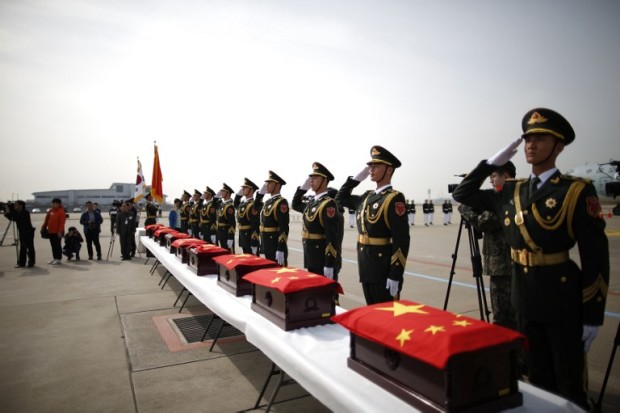In April, South Korea returned to China the remains of 36 Chinese soldiers killed in the Korean War for final burial in their homeland.
The remains were exhumed by the South Korean Defense Ministry last year. They were flown from Incheon airport to Shenyang in the northeast of China, where China’s state cemetery for war dead is located.
In a separate ceremony, the remains were placed in coffins at a temporary mortuary in Paju, near the North Korean border.
The Chinese were all part of the Chinese Volunteer Army. They were not officially members of the People Liberation Army but were rather volunteers against the American and South Koreans. From the Chinese perspective, the were defending North Korea from aggression.
In 2013, South Korean President Park Geun-Hye offered to return the remains of Chinese soldiers as a gesture of good will. Since that time, Seoul has sent a total of 550 sets of remains back to China. South Korea times the yearly shipment to arrive before the Chinese Qingming, a tomb-sweeping festival where many Chinese clean the graves of their ancestors.
Burying the death correctly and with the appropriate ceremonies is very important in Chinese culture.
China fought with North Korea in the conflict from 1950 to 1953. It joined the war after U.S. forces pushed the North Koreans into the far north of the peninsula. It, along with the North Koreans, pushed the Americans and the South Koreans, back. They even briefly captured Seoul, before being driven back North.
There is a dispute over the number of casualties from the Korean War. Western estimates cite 400,000 Chinese fatalities while Chinese sources state the number as 180,000. Over 1000,000 Chinese soldiers fought in the war.
After the war, the bodies of soldiers left in what became South Korea were buried in small plots around the country.
In 1996, Seoul designated a special plot for foreign soldiers in Paju, just south of its border with North Korea. More than 700 North Korean soldiers lie in Paju. So far, Pyongyang has ignored Seoul’s offer to return them.
The site contains the remains of over two dozen North Korean commandos who were killed in an unsuccessful 1968 raid on the presidential palace in Seoul. Also buried there is a North Korean agent who was responsible for the 1987 bombing of a South Korean airliner, an attack that killed 115 people, and who committed suicide after he was captured.
